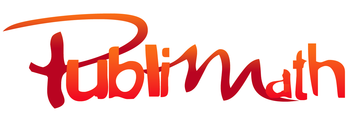History and Pedagogy of Mathematics: july 1-5 2024, Sydney, Australia. An experimentation of a learning path on history of mathematics in primary school (Grades 1-5): learning outcomes in mathematics and impact on pupil's human flourishing. p. 105-116.
(Expérimentation d'un parcours d'apprentissage sur l'histoire des mathématiques à l'école primaire (du CP au CM2) : résultats d'apprentissage en mathématiques et impact sur l'épanouissement humain des élèves.)
Une version texte intégral est en téléchargement sur le site Bibliothèque numérique des IREM et de l'APMEP Télécharger
Auteurs : Neri Machiaverna Francesca ; Millan Gasca Ana
Résumé
Cette présentation décrit une expérience d'enseignement conduite de 2018 à 2023 à Rome, utilisant l'histoire des mathématiques en primaire (degrés 1 à 5) : il expose les résultats dans l'apprentissage en mathématiques et l'impact sur l'épanouissement humain des élèves. Abstract Since 2006, action research at Roma Tre University (Italy) has explored the introduction of the history of mathematics into primary education. Topics from the history and anthropology of mathematics were integrated into mathematics courses in the Master’s Degree in Primary Education (Gil Clemente, Millán Gasca, 2016). This encouraged both students and in-service teachers from the Primary School Math Research Lab to explore how these historical aspects could be presented to children.
Following a suggestion by Karen Fuson in 2012, a history of mathematics learning path was developed for integration into the existing mathematics curriculum. As part of this broader research, a five-year pilot study (2018–2023) was conducted across all five grades of primary school in Rome. Contents were selected based on a structured learning path (Millán Gasca et al., 2017) and included children’s books on the history of mathematics. Assessment focused on standard learning outcomes in mathematics and history as well as “flourishing” personal growth outcomes (Millán Gasca 2016; see Su 2020).
Notes
Chapitre des Actes du colloque HPM 2024
Données de publication
Éditeur International Group on Relations between History and Pedagogy of Mathematics , Sydney , Australie , 2024 Format A4, p. 105-116 Index Bibliogr. p. 115-116
Public visé chercheur, enseignant, formateur
Type chapitre d’un ouvrage Langue anglais
Classification
